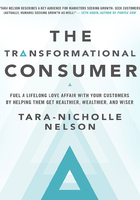
How to Think Like a Transformational Consumer
Tech, Tuna, and Toys That Transform
When people first learn about the Transformational Consumer, they very commonly assume that the conversation is limited to health products or financial brands. Not so. The aim of the framework is to get us to start thinking about our customers and their lives and the role we can play in them the same way they do.
They think much more broadly and much more flexibly about how products help them achieve their goals.
The only qualifier on whether a brand could become transformational is (a) whether people buy it in an effort to live healthier, wealthier, or wiser or (b) whether people choose it over another, competing product because it furthers their health, wealth, and wisdom goals. Through this lens, you will find transformation in surprising places:
 Tech. Obviously, health tech, EdTech, and FinTech companies are often transformational. But so are collaborative-consumption companies like Airbnb and Lyft, which empower people to use their homes and vehicles to make money and change their finances (pay off bills, start a business, etc.).
Tech. Obviously, health tech, EdTech, and FinTech companies are often transformational. But so are collaborative-consumption companies like Airbnb and Lyft, which empower people to use their homes and vehicles to make money and change their finances (pay off bills, start a business, etc.).
Lyft’s CMO, Kira Wampler, once told me that almost 60% of Lyft drivers in Los Angeles are actually musicians, actors, and artists who say they are able to keep at their creative endeavors because they can make income by driving. Airbnb’s head of product, Joe Zadeh, said he sees both the company’s hosts and its guests as Transformational Consumers: the guests because they want noncommercial travel experiences that help them develop as people and the hosts because they are putting their real estate resources to their best and highest use.
Most business and consumer office software, such as operating systems, aims to make people more productive at work and manage their time more efficiently, both of which fall under “wealthy” and “wise.” And the tech giants are also taking a transformational bent. Google’s “Goals” features allows people to dedicate time to their aspirations on their calendars, and Apple has invested billions in reaching Transformational Consumers with the Apple Watch.
and Apple has invested billions in reaching Transformational Consumers with the Apple Watch.
 Tuna. A friend of mine once challenged me about a photo of a woman buying tuna on the TCI website, asking me, “How is tuna helping her achieve her goals?” He was surprised when I shared the survey results that over 35% of Transformational Consumers specify “high-protein” as a guideline for how they try to eat. (Only 17% of non-Transformational Consumers say the same.) Buying a can of tuna may even help a Transformational Consumer achieve such goals as “save money by taking a lunch to work” or “eat better by cooking more at home.”
Tuna. A friend of mine once challenged me about a photo of a woman buying tuna on the TCI website, asking me, “How is tuna helping her achieve her goals?” He was surprised when I shared the survey results that over 35% of Transformational Consumers specify “high-protein” as a guideline for how they try to eat. (Only 17% of non-Transformational Consumers say the same.) Buying a can of tuna may even help a Transformational Consumer achieve such goals as “save money by taking a lunch to work” or “eat better by cooking more at home.”
 Toys. Many parents pick and purchase toys on the basis of educational and developmental features, facilitating their children’s developmental health and, arguably, wisdom as well. Both Lego
Toys. Many parents pick and purchase toys on the basis of educational and developmental features, facilitating their children’s developmental health and, arguably, wisdom as well. Both Lego and Disney
and Disney have deep, secondary businesses that provide education and training for businesspeople, helping them become wealthier and wiser—Google “Lego Serious Play Method” and “Disney Institute.”
have deep, secondary businesses that provide education and training for businesspeople, helping them become wealthier and wiser—Google “Lego Serious Play Method” and “Disney Institute.”
As business leaders, we often think about what’s possible for our businesses by sector and industry, by whether we’re a start-up or an incumbent, by whether we operate a brick-and-mortar or are fully online. But Transformational Consumers look at products through the lens of the changes they are trying to make and whether our products can help make them. That’s it. Don’t miss out on the opportunity to reach and engage billions of people worldwide because of your own limited thinking about your business.
From Consumer to Character
The archetypal Transformational Consumer is constantly looking for brands that will help them change their behavior and lives for the healthier, wealthier, and wiser. And when they find those brands, magic happens. Transformational Consumers will be the protagonists of the great company-customer love stories of our time.
But love stories aren’t written about archetypes. They are written about characters with rich, nuanced interior and exterior lives.
As characters, Transformational Consumers are real, living, breathing people, with unique visions, skills, and challenges. They are individual human beings, with personal flaws, fears, and dreams.
Contrary to conventional business wisdom, engaging these Transformational Consumers is not about telling a story of your brand or your company. It’s about crafting an authentic, relatable, warts-and-all before-and-after story about them and delivering products and content that help them progress along their journeys. It’s about telling a tale of the transformation that’s possible in their lives and about telling it in their own natural language. It’s about casting them in the role of hero on their own transformational journey and then providing the resources to make this story come true, over and over, for a lifetime.